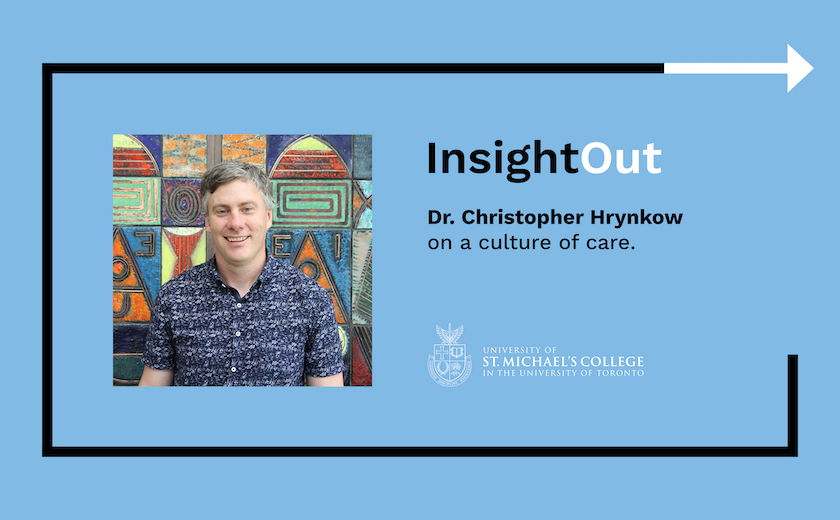Dr. Christopher Hrynkow holds a PhD (Peace and Conflict Studies, St. Paul’s College, University of Manitoba) and a ThD (Christian Ethics jointly awarded by the University of St. Michael College, the Toronto School of Theology, and the University of Toronto). Hrynkow is Associate Professor in Religion and Culture at St. Thomas More College, University of Saskatchewan, where he teaches courses in Religious Studies, Catholic Studies, Peace Studies, and Critical Perspectives on Social Justice and the Common Good. He presently serves as the founding director for St. Thomas More College’s new Centre for Faith, Reason, Peace, and Justice. Additionally, Hrynkow is Department Head, Program Chair, and Graduate Chair in Religion and Culture for the University of Saskatchewan.
A Culture of Care

COVID-19 has provided a real opportunity for us to pause and reconsider our ways of being in the world. Such reflection can bring into focus an important question for Christians, academics, and citizens today: what kind of world do we want to see after the pandemic? In considering adequate responses to this question, I know in my heart that we cannot go back to the status quo that existed in late 2019. First of all, especially after this dark winter, we will have lost too many folks who would have otherwise survived. As such, the world cannot ever be the same. Also, my faith along with my formal studies and research in areas including peace, education, and Christian Ecological Ethics have formed not only my mind but also my heart. The cumulative effect, in no small part as result of my experiences at St. Mike’s, is that I am certain we need a transition to more just and verdant ways of being in our religion, politics, education, and action in the world. Better choices in terms of what we select to revive and what we choose to leave behind in our cultures and societies as a result of the pandemic are required to participate in the necessary transformation. From a Christian perspective, this transformation is necessary to more fully accept Jesus’ call to be pilgrims for peace, justice, and the integrity of creation on Earth. Contemporary Catholic Social Teaching can provide a guide for this most important journey. In order to ground these opening points, please allow me to go deeper into one of the most recent examples of Catholic Social Teaching with my remaining space for this reflection.
Since Paul VI established the practice, each year and in anticipation of the World Day of Peace celebrated on January 1, the Catholic Bishop of Rome releases a message. In the 54th message, written for 2021 during a time of global pandemic, Pope Francis addressed A Culture of Care as a Path to Peace. This example of Catholic Social Teaching is both innovative and important. Herein, like his predecessors, Francis considers peace as much more than the mere absence of war but as also including positively defined conditions like social justice, gender equality, care for creation, and, as he himself helped to bring into focus, cultures of encounter and dialogue. Indeed, by introducing “a culture of care” to Catholic Social Teaching, he is recalling his earlier reflections that align with, and enrich, the content of “cultures of peace” so important to peace studies. The concept of cultures of peace is both analytical and aspirational. It helps us to discern those ways that are helpful in cultivating cultures of peace. Additionally, “cultures of peace” provides a framework to exercise our moral imaginations in creative ways in order to provide a vision to drive the action of building substantive peace.
In accord with these intertwined features of cultures of peace and drawing lessons about caring for both each other and the rest of creation from the events of 2020, Francis offers “a culture of care as a way to combat the culture of indifference, waste and confrontation so prevalent in our time” (#1). Summarizing the doctrine of the Catholic Church in light of a culture of care Francis teaches, “this doctrine is offered to all people of good will as a precious patrimony of principles, criteria and proposals that can serve as a ‘grammar of care’: commitment to promoting the dignity of each human person, solidarity with the poor and vulnerable, the pursuit of the common good and concern for protection of creation” (#6). In this light, Francis articulates a duty to promote a culture of care “as a process of education” (#8) in a holistic sense that moves far beyond the four walls of the classroom to touch upon the duties toward the common good not only of teachers and professors but also of those of families, faith leaders, and politicians amongst others. For Francis, supporting the common good with a spirit of solidarity is particularly important at a time when “the massive Covid-19 health crisis…[is] aggravating deeply interrelated crises like those of the climate, food, the economy and migration, and causing great suffering and hardship” (#1). As such, the Pope teaches there can be no substantive peace without a culture of care, which “calls for a common, supportive and inclusive commitment to protecting and promoting the dignity and good of all, a willingness to show care and compassion, to work for reconciliation and healing, and to advance mutual respect and acceptance” (#9). These are prime ingredients for any recipe aimed at nourishing the incarnation of cultures of peace in this world.
To conclude, I would note that in framing cultures of care as a path toward peace Francis is implying there are other paths towards peace, a selection of which he has already engaged in other exercises of his teaching office, including with Laudato Si’ and Fratelli Tutti. Peacebuilding work is transformative because these paths of dialogue and action exist within a reality of integral ecology, where everything is interconnected, as Francis also notes in the 54th World Day of Peace Message. Indeed, that connectivity means a culture of care is transformative whether it be incarnated in small doses like sharing nourishing food with a neighbour or in large doses like ensuring the just distribution of vaccines across both individual societies and the community of nations. Thus, if Francis’ teaching has resonance for you, the global pandemic is no barrier to the necessary transformative journey named in this reflection. In fact, despite its association with restricted movements, lockdowns, and curfews when viewed through a lens informed by a culture of care, COVID-19 actually serves to stimulate this transformative journey. It only remains for us to choose a path, or paths, to peace. Then, we begin, or indeed deepen, our work as pilgrims building up cultures of peace.
Read other InsightOut posts.

